Variety of apricot varieties for different regions
With proper care and compliance with planting dates, any apricot tree pleases gardeners with a rich and tasty harvest. To choose the right variety, it is recommended to study its characteristics: care rules, ripening period, immunity to diseases, yield. Some apricots bear fruit only in long, hot summers, while others thrive in regions with frost and wind. In the article we will provide a description of the best dessert and table varieties of apricots.
Early varieties of apricots
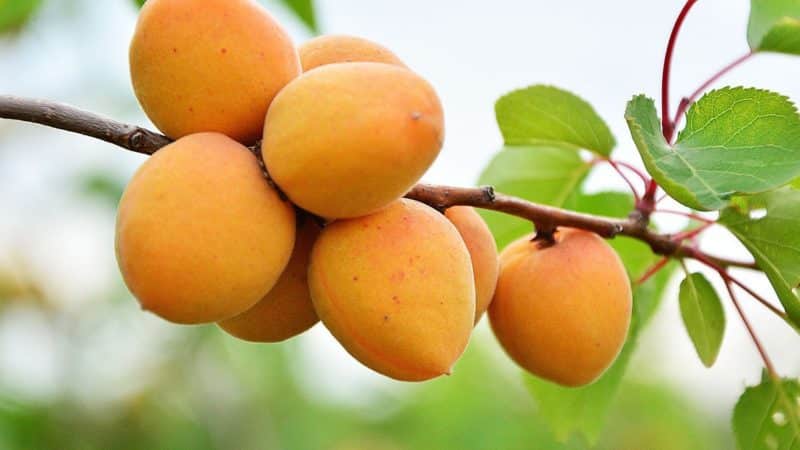
Apricot trees of early varieties bear fruit already at the beginning of summer - fruiting begins on June 25 and ends on July 5. The early harvest is consumed fresh or sent for processing. Most table varieties are not suitable for storage.
Melitopol early
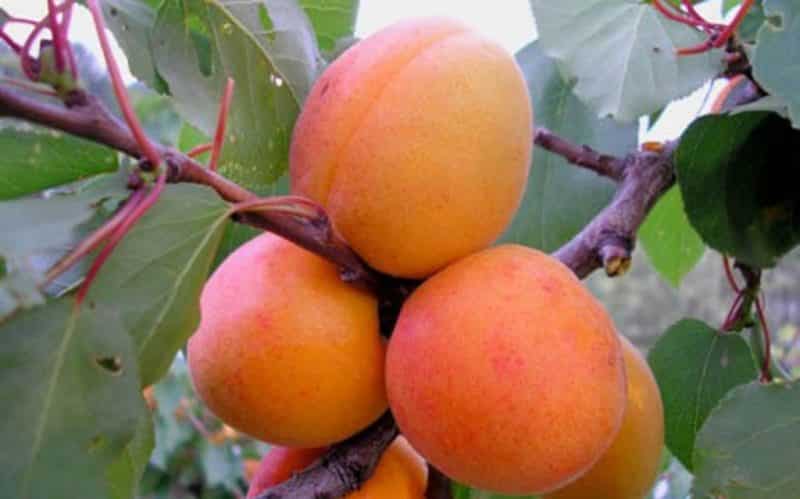
The self-pollinating high-yielding Melitopol early apricot bears fruit in the fifth year after landings. Apricot weight - 40 g, round shape. The peel is dense, the color is bright orange with a reddish blush on the side, the surface is velvety. The bone is located in the middle and is easily separated from the pulp. The variety is frost-resistant - can withstand temperatures down to -30°C.
Harostar
The mid-early variety is grown in regions with short and cool summers - in the Urals and Siberia. Fruit weight is 50-70 g, the surface is round, the color is orange-yellow with a red tint. The surface is smooth, the pulp is of medium density. In application, Harostar is universal and quick-bearing.To obtain a good harvest, it is recommended to add a superphosphate complex to the soil.
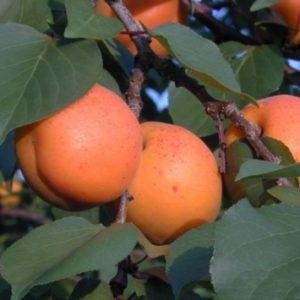
Bryansk early
According to reviews from experienced gardeners, the early ripening Bryansk early apricot takes root in any region of Russia. The tree is medium-sized, the fruits are small, weight is about 25 g. The color is yellow, the peel is dense - the crop is used for transportation and storage. The variety is self-fertile and disease resistant. The pulp is dessert, with a harmonious sweet taste.
Goldrich
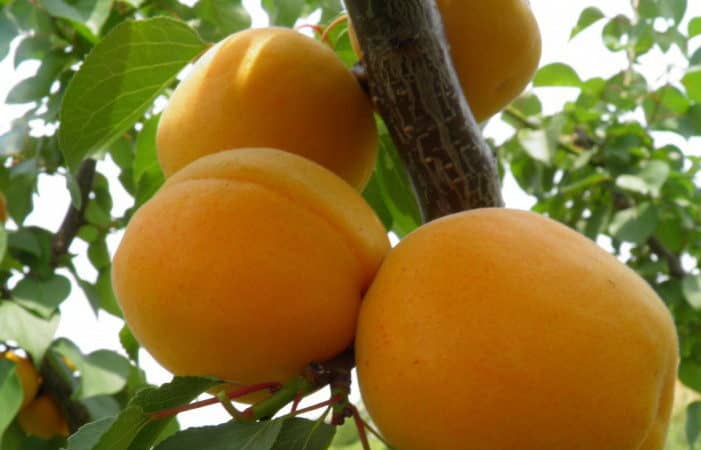
Winter-hardy and early-fruiting variety - the tree bears fruit in the second year after planting. Apricots are very large and appetizing - weighing 100 g, in some cases 150 g. The color is orange with a faint blush. The taste is sweet and sour, pleasant, the aroma is pronounced fruity. Medium size bone. Goldrich apricots can be stored for up to two weeks. To do this, use wooden boxes and newspapers; a suitable place is a cool and dark basement or cellar.
Kyiv early
The high-yielding Kiev early is unpretentious in care and bears fruit in the third year after planting. Winter-hardy, tolerates temperatures down to -25°C. Fruit weight - 80 g, oval-elongated shape. The color is orange with an attractive blush, the peel is thick and velvety, the fruits can be stored for up to three weeks. The stone is elongated, easily separated from the juicy and sweet pulp. Kiev early is resistant to rot and powdery mildew.
Interesting! People often confuse apricot, dried apricots and apricots. The latter refers to dried apricot fruits with a pit, while apricot is a fruit picked from a tree, and dried apricots are dried apricots without pits.
Mid-season varieties
Mid-season varieties finish bearing fruit in the 20th of July. They are distinguished by their large size and juicy pulp. The trees are unpretentious in care; the fruits do not fall off after ripening and hang on the branches.The exact timing of apricot ripening depends on the choice of variety, growing region, and compliance with care rules.
Dessert
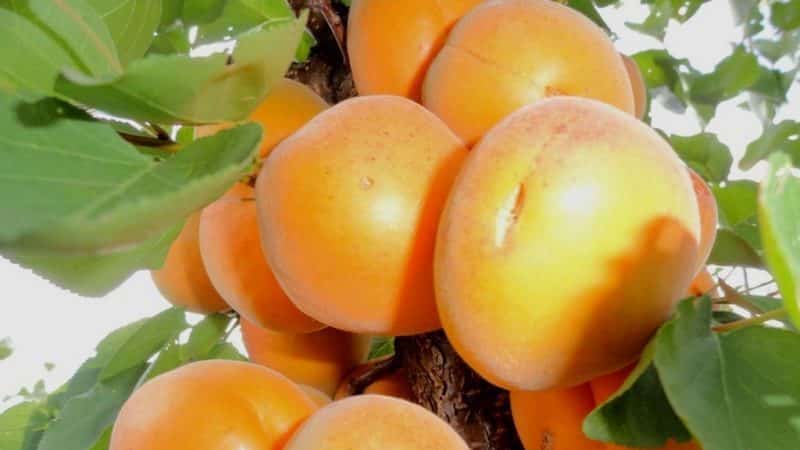
The mid-season variety ripens by July 15th. The fruits are medium in size, weighing about 30 g. The skin is thin, the color is pale yellow. The pulp is tender and juicy, the taste is sweet and sour. The large stone is easily separated from the pulp. Dessert variety is planted in central Russia. Used in cooking: added to ice cream, made fruit smoothies, baked muffins and cheesecakes.
Ulyanikhinsky
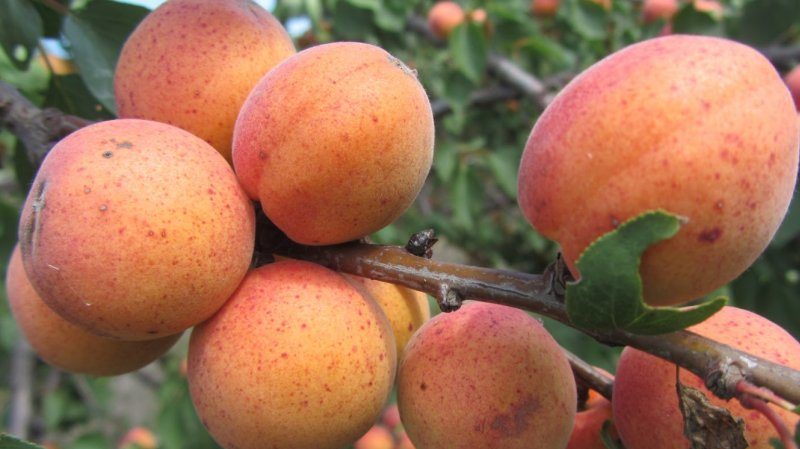
The Ulyanikhinsky apricot ripens at the end of July. The fruits are round-oval, weighing from 30 to 50 g. The color is bright yellow, there is slight pubescence. The pulp has a pleasant taste, sweet and sour. The variety is winter-hardy and disease-resistant, popular in the middle zone. Ulyanikha is used to make jam and compote. It is unpretentious in care, but needs regular organic and mineral supplements.
Aquarius
The fruits are round-oval, yellow-orange in color with slight pubescence. The pulp is tender, sweet and sour. The weight of an apricot is about 25 g, some specimens reach 40 g. Aquarius begins to bear fruit in the third year after planting. Resistant to insect pests, does not require special agrotechnical rules for care. The plant is covered for the winter, and in the spring they spend pruning and crown formation. Otherwise, the yield will decrease.
Royal
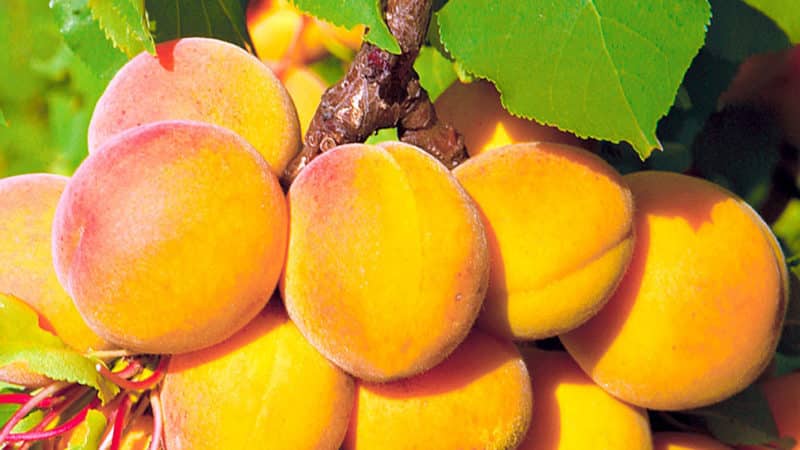
Royal apricot loves nutritious and well-moistened soil. Plant height is up to 3 m. The variety is self-fertile and rarely gets sick. The pulp is tender, with a slight sourness. The color of apricots is yellow with a pinkish blush, there is slight pubescence. Weight - up to 35 g, round, slightly flattened shape. Royal bears fruit in the fourth year after planting.
Big Red
Big Red apricot is distinguished by attractive commercial qualities - the yellow-red fruits look appetizing on the tree even after harvesting. Apricot weight is up to 100 g, the pulp is honey, the peel is dense. Big Red is frost-resistant, can withstand temperatures down to -30°C. The tree bears fruit in the third year after planting and is rarely affected by diseases. The dense peel protects the crop from cracking.
Olympus
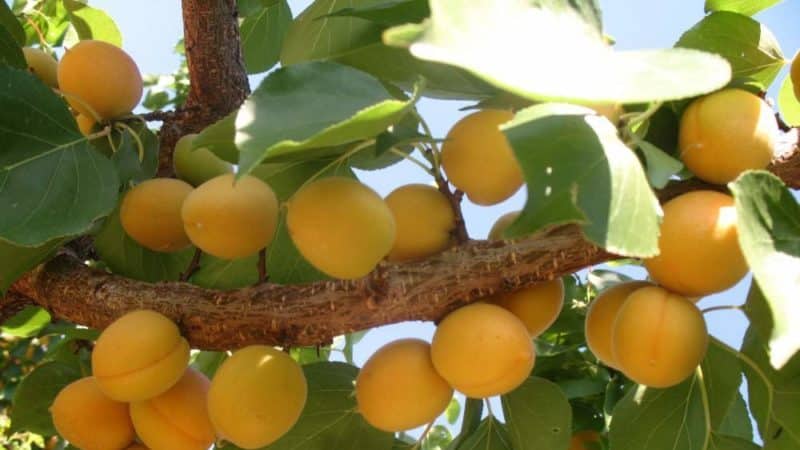
To plant the Olympus apricot, a large and spacious area is required - the tree is spreading and tall. The fruits are oval-ovoid, dark orange in color. Weight - from 40 to 70 g, the flesh is dense and sweet. The Olympus apricot ripens in its fourth year and is harvested after July 10th. Olympus is resistant to frost, aphid attacks and powdery mildew, and is rarely affected by viral diseases.
Phelps
A tree of medium vigor with a rounded crown. Apricot weight is 70-100 g, the color is yellow with blush, the shape is wide oval. The pulp is aromatic, the taste is balanced, sweet and sour. Phelps ripens in the first half of July and bears fruit for 4-5 years. Rarely affected by insects, disease resistant. After ripening, the fruits do not crack or fall off.
Interesting! Popular mid-season varieties include apricots of American selection. The Superior variety ripens in mid-July, the weight of the fruit is 60 g, the shape is oval-ovoid. It has an attractive appearance - the fruits are colored in a light orange tint, there is a blush and pinkish blurry dots. Another famous apricot - Jusi Honey - is distinguished by very tasty and juicy pulp with a honey aroma.
The best late apricot varieties
Late-ripening varieties are grown not only in private gardens, but also on farms. The harvest is used for storage and sale - apricots are distinguished by their keeping quality and transportability.Late varieties bloom at the end of July, the fruits are harvested in August.
Hargrand
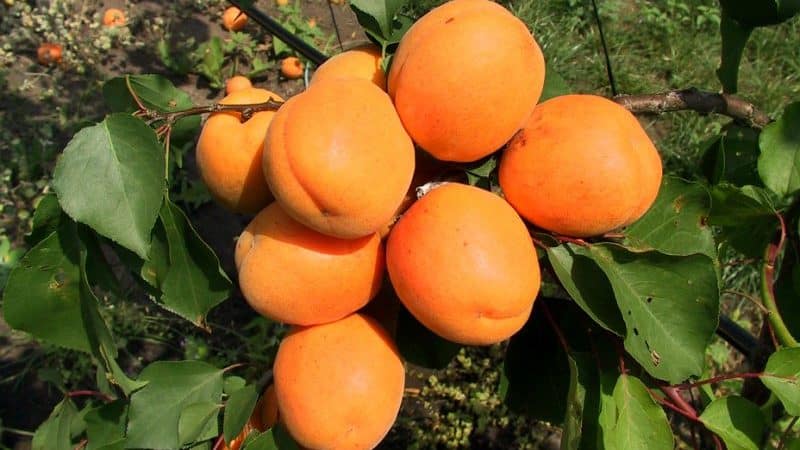
A late variety of Canadian selection ripens in the second ten days of July. The tree is medium-sized, the crown is dense, the leaves are elongated. The fruits are large, the weight of one reaches 70 g. The shape is round-oval, the color is orange with a pinkish blush. The pulp is honey, with a high sugar content. Sweet Hargrand apricots are good fresh - pleasantly refreshing on a hot day.
Favorite
A tree of moderate growth vigor, no more than 4 m in height. Fruit weight - 30 g, round-oval shape, ribbed surface. The pulp is dense and gristly, the taste is rated 5 points out of 5. The Favorite apricot begins to bear fruit 4-5 years after planting. The variety is drought-resistant and frost-resistant, the fruits are suitable for fresh consumption and for making jam and jam.
Orlovchanin
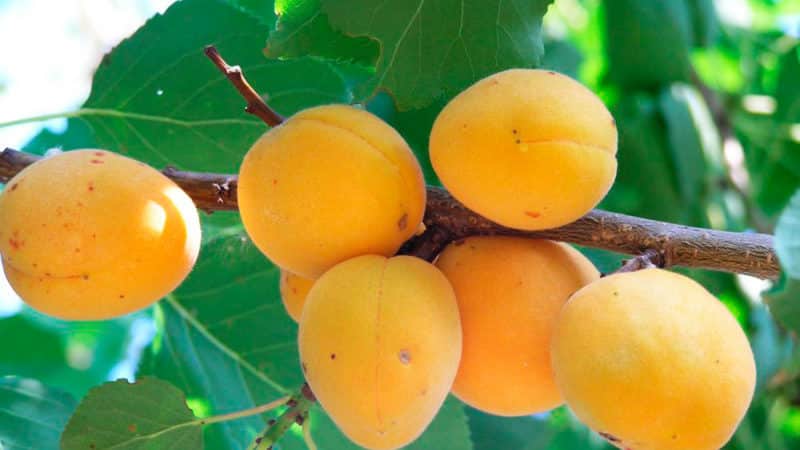
The early-fruiting Orlovchanin apricot produces its first harvest in the third year of life. Resistant to viral and fungal diseases, rarely damaged by insect pests. The weight of the fruit is 30 g, the shape is round-ovoid, the color is yellow with dots. The small stone is easily separated from the pulp, the harvest is suitable for transportation and has a shelf life.
Sardonyx
The variety is frost-resistant and ripens by August 10. Sardonyx is partially self-fertile, so gardeners plant other apricot trees nearby for cross-pollination. Apricot weight is 40-50 g, the pulp is tender and sugary, with an elastic consistency. The color is rich orange, the peel is dense. Sardonyx is easy to care for; seedlings are planted in the spring. Moscow and the region are chosen for landing.
Varieties with small fruits
Small-fruited varieties are used for preservation - small apricots look appetizing in jars.They are also used for sale and transportation. The weight of small fruits is 15-20 g, the pulp is moderately sweet, the peel is dense.
Snezhinsky
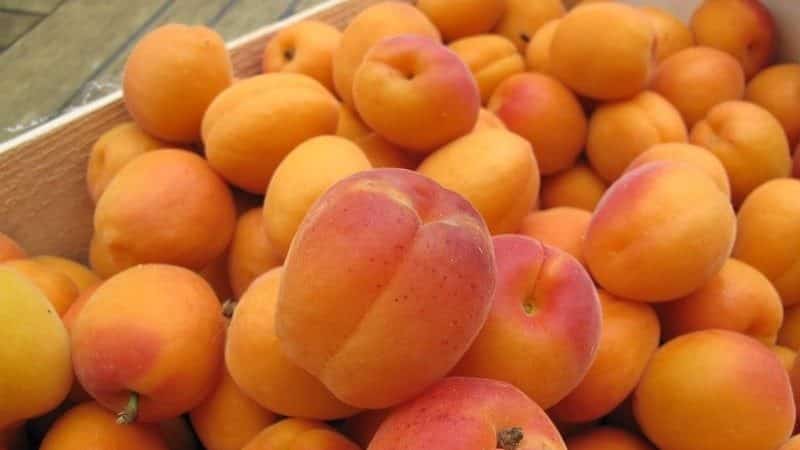
The tree is medium-sized with a spreading crown. The weight of the fruit is 21 g, the color is yellow with dark red dots. The peel is dense with slight pubescence. The flesh is pale orange, soft and juicy, the taste is sweet. The commercial quality of Snezhinsky apricot is rated at 5 points. The round bone is easily removed from the pulp. The harvest is used fresh and as an ingredient for baking, desserts, and drinks.
Iceberg
The height of the tree is 3 m, the crown is medium spreading. The fruits are small, weighing 18-22 g. The peel is orange-yellow, thin, with slight pubescence. The pulp is yellow, dessert taste, tasting score - 4 points out of 5. The advantages of Iceberg apricot are keeping quality, versatility, frost resistance. Summer residents harvest in late July - early August.
Success
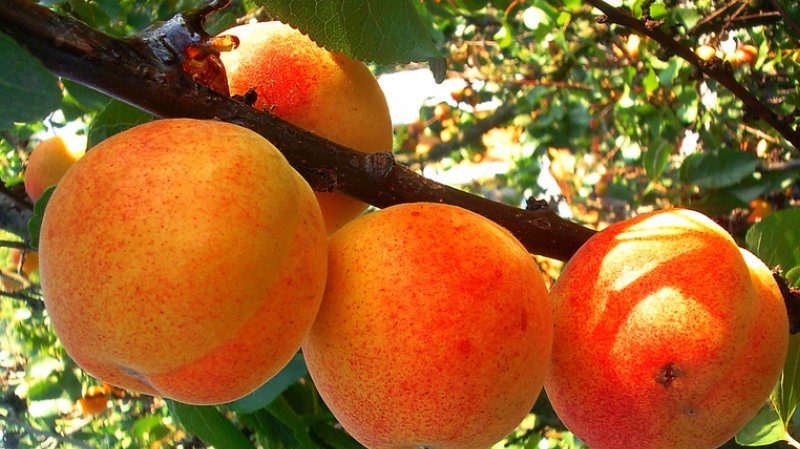
The tree is medium-sized, the crown is pyramidal-rounded. Success ripens at the end of August, and in the middle zone and northern regions - at the beginning of September. The weight of the fruit is 23 g, the shape is round, the skin is thin. Apricot Success is painted in a yellow-amber hue and shimmers beautifully in the sun. The pulp is fibrous, the taste is harmonious, sweet and sour. Success is a fast-growing variety, bearing fruit 4-5 years after planting.
Amur
The average weight of the Amur apricot is 20-22 g, the shape is round-oval. The color is rich yellow with carmine dots. The pulp is medium juicy, sweet. The fruits are used for technical processing and grown on an industrial scale. Cupid begins to bear fruit in the third year of life. Ripening occurs on August 10-20, depending on the growing region and weather conditions.
Edelweiss
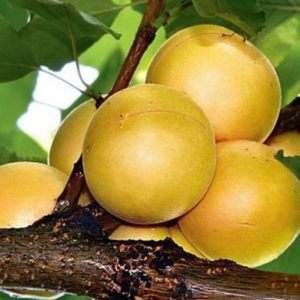
The mid-late variety is planted in the Moscow region and in the south of the country.The weight of the fruit is 20 g, the flesh is cartilaginous and dense, the color is yellow-orange. There is slight pubescence on the surface, the taste is harmonious, moderately sweet. The heart-shaped stone is easily separated from the pulp. Advantages include drought resistance and immunity to disease.
Viking
Viking blooms in April - May, producing the first harvest in June. The fruits are round, the surface is smooth. The color is rich yellow, the weight of the apricot is about 20 g. The taste is sweet, harmonious, with a pleasant fruity aroma. Viking is universal in use - apricots make delicious winter preparations.
White apricots
There are no white apricots, but there are varieties with a milky orange color, which is why summer residents gave them that name. In taste and use, white fruits are no different from the classic yellow and orange ones.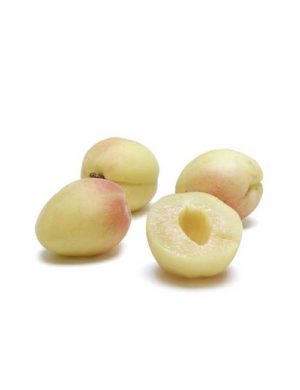
Peach
Peach apricot ripens in the mid-late period and is unpretentious in care. The shape of the fruit is round-oval, weight - about 50 g. The skin is pubescent, the color is pale yellow, without blush. The pulp is tender and juicy, sweet, easily separated from the small stone. At the stage of technical ripeness, apricots are used for transportation.
Albino
Light yellow fruits delight gardeners with their original appearance. The shape is round-oval, flattened, the weight of the apricot is about 20 g. The pulp is medium density, yellowish in color, pleasant to the taste. The fruits are suitable for fresh consumption and processing. After harvesting, they are stored for up to 30 days and do not lose their taste and commercial qualities. Albino ripens in late July or early August.
Sirius
The mid-ripening Sirius apricot ripens by mid-July. The color is pale orange with blush. The weight of the fruit is up to 40 g, the pulp is pleasant to the taste, sweet and sour.The tree is spreading and vigorous, the immunity to diseases is average. The shelf life of apricots after harvest is no more than two weeks.
Seraphim
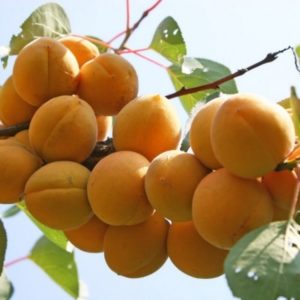
The variety is mid-season; in the southern regions, the harvest is harvested in the first ten days of July. The color of the fruit is cream, with an orange-yellow blush visible from the sunny side. The shape is round, flattened. The skin is velvety with pubescence and is difficult to separate from the pulp. The pulp is tender, mealy, the taste is sweet, the aroma is average. Apricot Seraphim begins to bear fruit at 2-4 years of age. Productivity is about 30 kg per tree.
Conclusion
Apricots vary in ripening time. Early ripening varieties Goldrich and Harostar produce a harvest already at the beginning of summer - the fruits are eaten fresh or made into compotes and jam. Mid-season varieties ripen by mid-July. Gardeners plant Royal, Phelps, and Olympus seedlings on the site. They are distinguished by large fruits and juicy pulp. Late varieties Favorit and Orlovchanin are used for storage and transportation. Apricots retain their taste and marketability and do not crack. The ripeness of fruits is determined by their characteristic color, dense peel and pubescence, and a pleasant and sweet aroma.